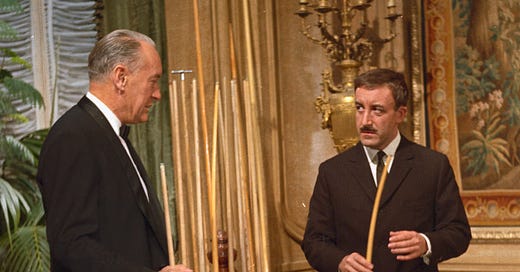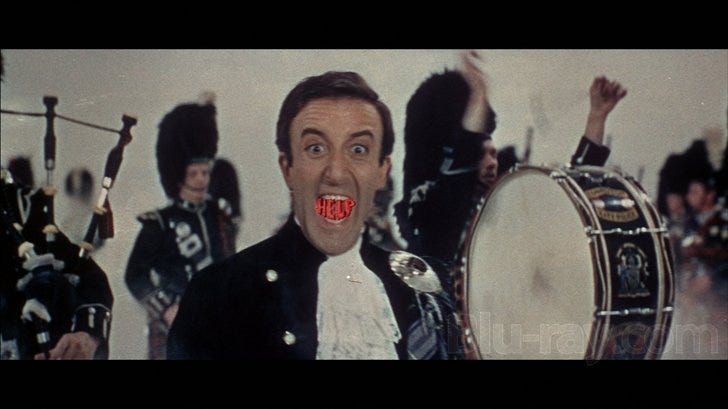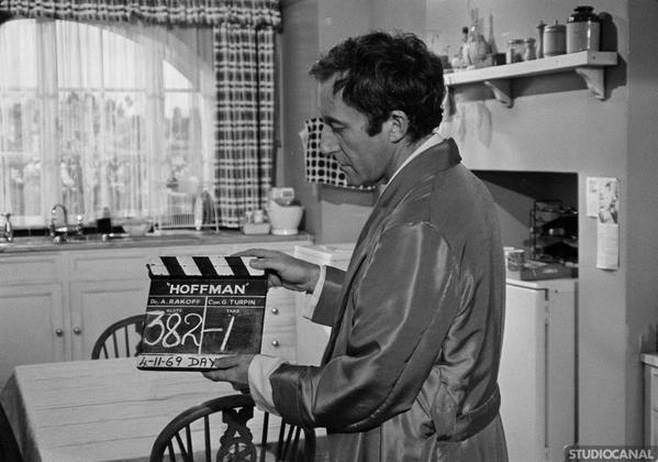The Many Faces of Peter Sellers part 2: Hollywood & The Loving Light
In 1964, fresh from the success of The Pink Panther and A Shot in the Dark, Peter Sellers came to Hollywood to work with legendary Director Billy Wilder and Dean Martin for the ribald comedy Kiss Me, Stupid. Things were really looking up, he was world famous, sought after and had just married Britt Ekland. Not only that but he was in Hollywood enjoying his honeymoon and had even stopped by to meet his idol Stan Laurel. After a trip to Disneyland Sellers suffered his first heart attack. Alleged excessive drug use and wild dieting had put too much pressure on his heart and that night it just gave out.
During the first of a rapid series of eight heart attacks, when his heart stopped and he was clinically dead, he had an out-of-body experience and saw a bright light. Sellers later said, "Well, I felt myself leave my body. I just floated out of my physical form and I saw them cart my body away to the hospital. I went with it … I wasn't frightened or anything like that because I was fine; and it was my body that was in trouble." Meanwhile, the doctor saw that Sellers was dead and began to massage his heart vigorously. Sellers stated, "I looked around myself and I saw an incredibly beautiful bright loving white light above me. I wanted to go to that white light more than anything. I've never wanted anything more. I know there was love, real love, on the other side of the light which was attracting me so much. It was kind and loving and I remember thinking That's God." Sellers' out-of-body soul tried to elevate itself toward the light, but fell short. Sellers stated, "Then I saw a hand reach through the light. I tried to touch it, to grab onto it, to clasp it so it could sweep me up and pull me through it." But just then his heart began beating again, and at that instant the hand's voice said, "It's not time. Go back and finish. It's not time." As the hand withdrew Sellers felt himself floating back down to his body, waking up bitterly disappointed. Although Sellers survived, his heart was permanently damaged.
Alexander Walker, his biographer, stated that "The repeated act of dying became for Peter Sellers the most important experience of his life." Sellers himself said of death, "I'll never fear it again." Family and friends found him more spiritual and reflective than before. He began to trust spiritualists over all others. Most (if not all) decisions were based on advice received from Maurice Woodruff, his clairvoyant and astrologer.
Walker stated, "The experience of resurrection intensified Sellers' spiritual concern and friends discerned the start of a new introspectiveness, a sense of his not "being there" in spirit, though present in body."
Sellers' new wife, Britt Ekland, found it unnerving that her previously restless husband had now become so quiet. He was now "sitting still over lengthy periods, saying nothing, but staring at her with his thoughts turned inward." Sellers returned to England for an extended convalescence.
Even though the film was six weeks into shooting, Billy Wilder replaced Sellers with Ray Walston, reshot his scenes and Kiss Me, Stupid carried on without him.
Sellers was tempted out of his convalescence with a whacky performance as Dr. Fritz Fassbender in the "out there" film (and Woody Allen's film debut as star and writer) What's New Pussycat.
He then appeared in a wonderful cameo role as the cat-crazed confused Dr. Pratt in the British Victorian comedy The Wrong Box alongside a very young Peter Cook.
Now fully convalesced, Sellers took on the role of Aldo Vanucci in the Neil Simon (The Odd Couple, The Sunshine Boys) debut screenplay, After The Fox. There was even a part for Britt Eckland who played his young sister who has aspirations to become an actress.
It was his next project however that Sellers began to get a reputation for being a pain in the arse to work with. Casino Royale was Sellers' chance to prove that he could be a straight lead actor and play James Bond like Cary Grant. He became very disappointed when it became apparent that it was to be a bawdy comedy. He became disillusioned with the project and would often disappear from the set for days at a time.
He also began a feud with Orson Welles (by whom he felt intimidated) and refused to be on the set at the same time as Welles. This caused further problems as they shared a scene that was very important to the film. It was his behaviour on this film that perhaps ultimately finished the "love-in" he had been having with Hollywood.
The production proved to be rather troubled, with five different directors helming different segments of the film, and stunt co-ordinator Richard Talmadge co-directing the final sequence. In addition to the credited writers, Woody Allen, Peter Sellers, Val Guest, Ben Hecht, Joseph Heller, Terry Southern, and Billy Wilder are believed to have added to the screenplay. Val Guest was given the responsibility of splicing the various "chapters" together, and was offered the unique title of "Co-ordinating Director" but declined, claiming the chaotic plot would not reflect well on him if he were so credited. His extra credit was labelled "Additional Sequences" instead.
The end product is an utter incoherent semi-unwatchable over indulgent mess with the only good point being a great soundtrack.
There followed a few more films which were all disappointing to Sellers, The Bobo, There's a Girl in my Soup and the seldom seen Where Does it Hurt?
Perhaps the only film which is note worthy from this period is the odd character piece Hoffman in which Sellers plays a older man who invites a young lady to his flat for a sexual liaison. As the film progresses, you find out that Sellers' character caught one of his workers dealing in a scam, and decided to blackmail the man's lovely fiancé away for a full week to convince her to fall in love with him.
Mostly a drama, the film has an almost terrifying performance by Sellers, involved in intricate mind games with the other protagonists. The film is worth watching as according to Sellers, it is the only film which captures his own personality (which would worry me). It is also a very powerful straight performance and really shows that the line between comedy and pathos is very fine.
The 1970s was a very unfulfilling period for Sellers with every film flopping at the box office. It became so desperate that he eventually agreed to return to the Pink Panther franchise. Initially it was to be a 26 part TV series but eventually it became the 1975 film The Return of the Pink Panther. This is the film in which the Clouseau character becomes heavily diluted and begins to speak in the exaggerated French accent.
While this is funny, it is odd and smacks of a desperation to be funny to change the character you played as a mild bumbler in the previous film to an all out idiot who can barely speak his own language. This unfortunately is what Sellers had been reduced to. With the subsequent sequels the character devolved into further idiocy and became more dependant on outrageous disguises and farcical situations. At the time of his death, Sellers was working on a new Pink Panther film (Romance of the Pink Panther).
There was one project throughout this entire period though that engrossed Sellers and became his obsession to get it on the big screen. The book Being There by Jerzy Kosinski, the story of simple-minded Chance the gardener, who has spent all his life in the Washington D.C. house of an old man. When the man dies, Chance is put out on the street with no knowledge of the world except what he has learned from television. After a run in with a limousine, he ends up a guest of a woman (Eve) and her husband Ben, an influential but sickly businessman. Now called Chauncey Gardner, Chance becomes friend and confidante to Ben, and an unlikely political insider.
Sellers fought to buy the rights and felt he was the character Chance, a blank canvas who seemingly has no personality. He would call Kosinski constantly and send postcards and letters signed "Chance" and "Gardener available for work". The stumbling block was initially that Sellers' output in the 1970s had meant that he had hit rock bottom and no studio in Hollywood would dare work with him. Luckily for Sellers, the Pink Panther movies had made lots of money and it was felt that he was worth the gamble.
Would this finally be the ticket to artistic acceptance?






